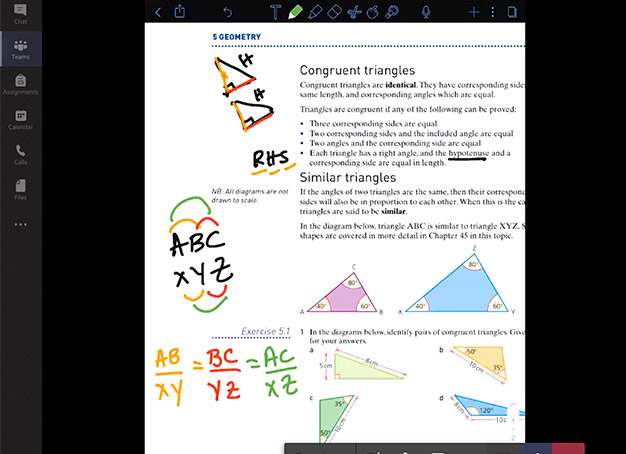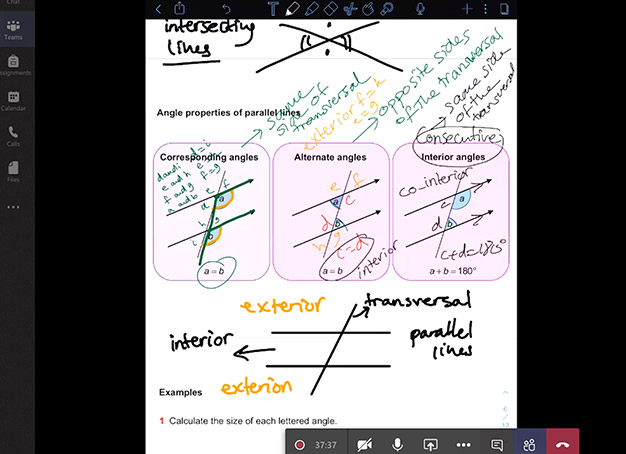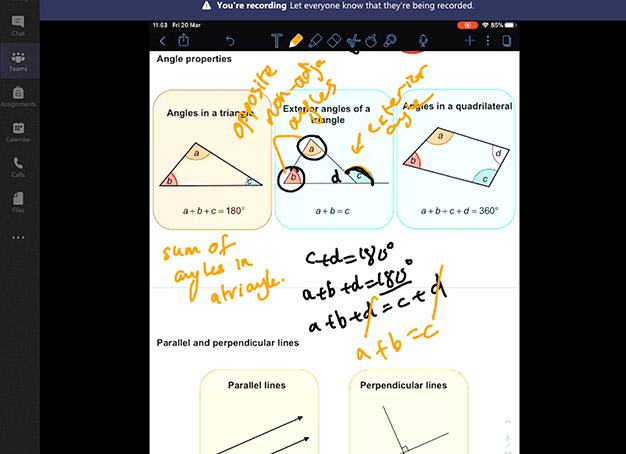Blog Article: BHS Maths – Virtual Learning
Wednesday, 25 March 2020
Share this article:
PREPARED BY MAYSSAA HAIDAR
ON BEHALF OF THE BHS MATHS DEPARTMENT
DATE: 25 MARCH, 2020
The ambition of the Maths Department at Brummana High School is to build a mathematical-based programme that focuses on empowering young people to become long-life learners, critical thinkers, problem solvers and innovators. With this aim in mind, it is important to develop thinking skills that add value to the lives of young people. As we have been challenged by the global coronavirus (COVID-19) crisis, we nonetheless continue to fully support our students’ learning and their preparation for various examinations over the coming weeks and and months, including the IGCSE Maths exam. In response to the ongoing COVID-19 pandemic, BHS mathematics teachers have completely transformed the delivery of teaching their courses from face-to-face to online classes. We have provided digital learning materials and recorded virtual classes that are made available for students to access at their own convenience. Although the internet connection is very slow in Lebanon, our students are gaining a remarkable experience by tackling these virtual learning classes.
This week I started offering IGCSE Geometry sessions in the Cambridge Assessment International Examinations curriculum. The UK’s Cambridge curriculum is taught not only in the UK but also in many leading international schools all over the world. With BHS’ strong British roots, as well as British influence continuing to the present day, we are happy to make Cambridge courses available to students. Indeed, our offering is set to expand in the 2020-2021 academic year, from the Intermediate and Secondary sections to include the Elementary (Primary) section too, meaning students from Grades 1 to 12 will all have the opportunity to study the Cambridge programme.

I am using PowerPoints and the textbook from Cambridge as tools to connect with students and enable their discovery and learning. I am concentrating on teaching the lesson “Geometrical Vocabulary” which I consider in my view an essential lesson since using specific and concise mathematical terms and symbolic notations play a critical role in learning the language of mathematics. In this lesson, we discussed and interpreted the geometrical terms such as acute, obtuse, right angle, reflex, parallel, perpendicular, congruent and similar. Then, we moved on to look at different relationships that might exist between these terms. Students were eager to discuss different possibilities for these relationships. At the same time, we used different tools and varied activities to visualise these examples. These tools provided students with a structure to develop their own thinking using spatial reasoning. The variations that we looked at were: different angles on a straight line and intersecting straight lines; vertically opposite angles; alternate and corresponding angles on parallel lines; angle sum of a triangle, quadrilateral and polygon; and interior and exterior angles of a polygon.

In these examples, students were able to suggest a hypothesis, an explanation or inference that may lead to a range of conclusions that can be tested and verified with logical and spatial reasoning when dealing with shapes. These skills are used in problem solving that contributes to the development of critical thinking. Students used these skills to solve problems collaboratively by seeking different perspectives from me and their classmates. In this process, students appreciated the value of searching for alternative ways of finding different methods to solve problems. At the end of this session, we discussed new plans for the coming week where students are given the material in advance to explore before their online session. This provides an opportunity for students to develop their own questions and discuss them with me and their classmates in a cooperative setting using a virtual platform.
Developing questioning and reasoning skills to solve problems in a collaborative environment enhances students critical thinking to become successful mathematicians and independent learners. Being able to provide this education to our students is of paramount importance as they continue to pursue their studies and then take those skills on to university and future careers. Being able to continue providing these classes despite the COVID-19 pandemic is a testament not only to the hard work of all staff at the school, but also to the students who have actively participated in classes. Of course, we hope to return to school and a more ‘normal’ way of life sooner rather than later, but for now we are confident our students are taking on board the knowledge and skills they need to be equipped with, including the knowledge and skills provided in this Geometric Vocabulary class in this example.





